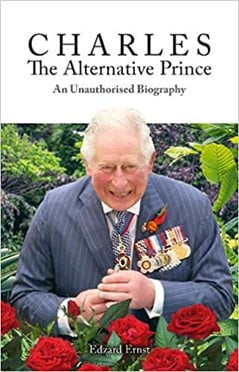Over the past two decades, I have supported efforts to focus healthcare on the particular needs of the individual patient, employing the best and most appropriate forms of treatment from both orthodox and complementary medicine in a more integrated way.
The Prince of Wales 1997
This quote is a charmingly British understatement, indeed! Prince Charles has been one of the most persistent champions of so-called alternative medicine (SCAM) in the world. Since the early 1980s, he has tried everything in his power to boost the image of SCAM, to improve the status of SCAM practitioners, to make SCAM more available to the general public, to lobby that SCAM should be paid for by the National Health Service, to ensure the press reported favourably about SCAM, and to influence politicians to provide more support for SCAM.
He has fought for these aims on a personal, emotional, political, and societal level. He has used his time, his intuition, his influence, and occasionally his money to achieve his goals. In 2010, he even wrote a book, ‘Harmony’, in which he explains his ideas about SCAM in some detail. Charles has thus become the undisputed champion of the realm of SCAM. For that he is admired by SCAM practitioners across the globe.
Yet, his relentless efforts are not appreciated by everyone (another British understatement!). There are those who view his interventions as counter-productive distractions from the important and never-ending task to improve modern healthcare. There are those who warn that integrating SCAM into our medical routine will render healthcare less efficient. There are those who claim that the Prince’s preoccupation with matters that he is not qualified to fully comprehend is a disservice to public health. And there are those who insist that the role of the heir to the throne does not include interfering with health politics.
So, are Charles’ ideas new and exciting? Or are they obsolete and irrational? Has Charles become the saviour of healthcare? Or has he hindered progress? Is he a role model for medical innovators? Or the laughing stock of the experts? Is he a successful reformer of healthcare? Or are his concepts doomed to failure?
Charles appears to evade critical questions of this nature. Relying on his intuition, he unwaveringly pursues and promotes his personal beliefs, regardless of the evidence. He believes strongly in his mission and is, as most observers agree, full of good intentions. If he even notices any criticism, it is merely to reaffirm his resolve and redouble his efforts. He is reported to work tirelessly, and one could easily get the impression that he is obsessed with SCAM.
I have observed Charles’ efforts around SCAM for the last 30 years. Occasionally, I was involved in some of them. For 19 years, I have headed the world’s most productive team of researchers in SCAM. This background puts me in an unique position to write an account of Charles’ ‘love affair’ with SCAM. My recently published ‘unauthorised biography’ is not just a simple outline of Charles’ views and actions but also a critical analysis of the evidence that does or does not support them. In writing it, I pursue several aims:
- I summarise this part of medical history, as it amounts to an important contribution to the recent development of SCAM in the UK and beyond.
- I hope to explain how Charles and other enthusiasts of SCAM think, what motivates them and what logic they follow.
- I contrast Charles’ beliefs with the published evidence as it pertains to each of the SCAMs he supports.
- I aim to stimulate my readers ability to think critically about health in general and SCAM in particular.

My ‘unauthorised biography’ follows Charles’ activities in roughly chronological order. Each time we encounter a new type of SCAM on this journey, I provide a quick review of the actual evidence for or against it. While writing this book, one question occurred to me regularly: Why has nobody so far written a detailed history of Charles passion of SCAM? Surely, the account of Charles ‘love affair’ with SCAM is fascinating, diverse, revealing, and important!
I hope you agree.
Charles, The Alternative Prince: An Unauthorised Biography by Edzard Ernst is published by Societas and is available now.



